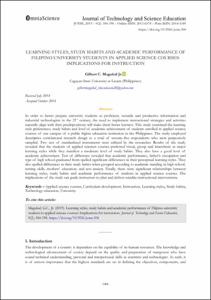Mostra el registre d'ítem simple
Learning styles, study habits and academic performance of Filipino University students in applied science courses: Implications for instruction
| dc.contributor.author | Magulod Jr., Gilbert C. |
| dc.coverage.spatial | east=121.60604620000004; north=18.0774359; name=Lasam - Magapit Rd, Lasam, Cagayan, Filipines |
| dc.date.accessioned | 2019-06-12T15:11:55Z |
| dc.date.available | 2019-06-12T15:11:55Z |
| dc.date.issued | 2019-03 |
| dc.identifier.citation | Magulod Jr., G. C. Learning styles, study habits and academic performance of Filipino University students in applied science courses: Implications for instruction. "JOTSE: Journal of Technology and Science Education", Març 2019, vol. 9, núm. 2, p. 184-198. |
| dc.identifier.issn | 2013-6374 |
| dc.identifier.uri | http://hdl.handle.net/2117/134350 |
| dc.description.abstract | In order to better prepare university students as proficient, versatile and productive information and industrial technologists in the 21st century, the need to implement instructional strategies and activities naturally align with their predispositions will make them better learners. This study examined the learning style preferences, study habits and level of academic achievement of students enrolled in applied science courses of Cagayan State University at Lasam, Philippines. The study employed descriptive correlational research design to a total of seventy-five respondents who were purposively sampled. Two sets of standardized instruments were utilized by the researcher. Results of the study revealed that the students of applied sciences courses preferred visual, group and kinesthetic as major learning styles while they manifest a moderate level of study habits. They also have a good level of academic achievement. Test of difference revealed that academic performance, father's occupation and type of high school graduated from spelled significant differences in their perceptual learning styles. They also spelled differences in their study habits when grouped according to academic standing in high school, writing skills, mothers’ education, and test anxiety. Finally, there were significant relationships between learning styles, study habits and academic performance of students in applied science courses. The implications of the study can guide instructors plan and deliver suitable instructional interventions. |
| dc.format.extent | 15 p. |
| dc.language.iso | eng |
| dc.publisher | OmniaScience |
| dc.rights | Attribution-NonCommercial 4.0 International |
| dc.rights | Attribution-NonCommercial-NoDerivs 3.0 Spain |
| dc.rights.uri | http://creativecommons.org/licenses/by-nc-nd/3.0/es/ |
| dc.subject | Àrees temàtiques de la UPC::Ensenyament i aprenentatge::Psicologia de l'educació::Psicologia de l'aprenentatge |
| dc.subject.lcsh | Academic achievement |
| dc.subject.lcsh | College students |
| dc.subject.lcsh | Learning |
| dc.subject.other | Learning styles |
| dc.subject.other | Study habits |
| dc.subject.other | Applied science courses |
| dc.subject.other | University |
| dc.subject.other | Curriculum |
| dc.title | Learning styles, study habits and academic performance of Filipino University students in applied science courses: Implications for instruction |
| dc.type | Article |
| dc.subject.lemac | Rendiment escolar |
| dc.subject.lemac | Estudiants universitaris -- Hàbits |
| dc.subject.lemac | Aprenentatge -- Ensenyament universitari |
| dc.identifier.dl | B-2000-2012 |
| dc.description.peerreviewed | Peer Reviewed |
| dc.rights.access | Open Access |
| local.citation.publicationName | JOTSE: Journal of Technology and Science Education |
| local.citation.volume | 9 |
| local.citation.number | 2 |
| local.citation.startingPage | 184 |
| local.citation.endingPage | 198 |
Fitxers d'aquest items
Aquest ítem apareix a les col·leccions següents
-
2019, Vol. 9. núm. 2 [10]


